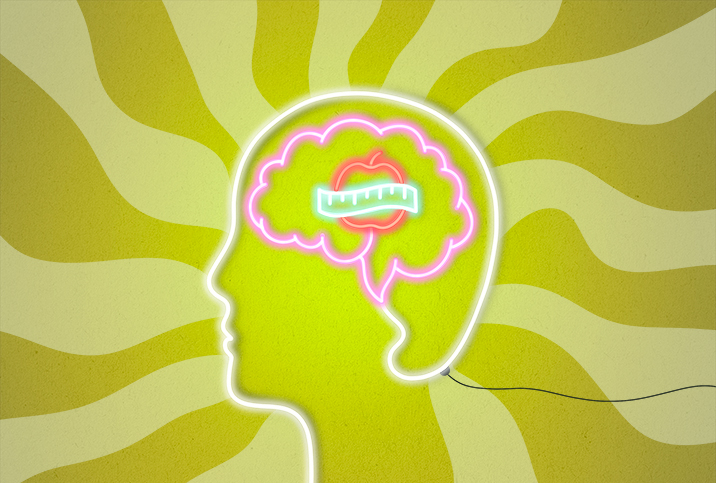Scientists Analyze Complex Link Between Hormones and Eating Disorders

Food is essential for survival, providing the nutrients we need for our bodies to function. When someone has an eating disorder, their body undergoes biochemical changes, including at the hormonal level.
Hormones are important components of our bodies. They are chemical messengers, regulating the body's processes, including hunger, sexual desire and blood pressure. In the body, hormones are produced by glands. Each gland produces hormones for a specific purpose. For example, hormones produced by the hypothalamus gland regulate body temperature, hunger, mood, thirst, sleep and libido.
Considering the important role hormones play in regulating both mood and hunger, some researchers have theorized hormones may play a role in the development of eating disorders.
But, as it turns out, this is a complex question, and akin to asking which came first: the chicken or the egg? Since biochemical changes happen as a result of eating disorders, it's hard to decipher if the changes are a result of the eating disorder or a causation of it.
It's particularly difficult to decipher cause and effect for eating disorders where the body is starving, such as anorexia. However, for binge eating disorders, the link is more straightforward because the body isn't undergoing as many biochemical changes. Let's take a look at what scientists know so far.
Ovarian hormones can increase binge eating
Throughout the menstrual cycle, hormones fluctuate and scientists know these fluctuations can drive changes in mood. However, hormones can also impact binge eating. Kelly Klump, Ph.D., a clinical psychologist and researcher at Michigan State University, has confirmed in her research that ovarian hormones drive increases in binge eating and emotional eating across the menstrual cycle.
During the second half of the menstrual cycle, postovulation, the highest rates of binge eating are consistently reported. During this part of the cycle, estrogen and progesterone levels are high. This aligns with findings in animal studies, which show a direct correlation to ovarian hormones and food ingestion.
Klump's research also suggests puberty is a critical point for the activation of genes that make some people susceptible to developing an eating disorder. More research is needed to decipher what definitively happens during puberty to affect the development. "The research suggests it's not just what you do in adulthood, but something happens in puberty to cause the development of these disorders," Klump said in an interview.
Stress is correlated with increased intake of high-calorie foods
When your body is stressed, the hormone cortisol is released into your bloodstream, resulting in heavier breathing, higher heart rate, and, in some cases, problems with immune health and sleep.
To cope with stress, it's hypothesized that some people turn to hyperpalatable foods. These are foods people always want more of, typically ones that contain higher concentrations of sugar, salt and fat. Think fast food and greasy home-cooked comfort meals. Increased stress has been correlated with an increase in consumption of caloric-dense foods and increased obesity risk.
Eating disorders can cause fertility and pregnancy complications
Scientists know eating disorders that result in very low body fat can impact fertility. Women suffering from anorexia or bulimia are at an increased risk of menstrual and fertility problems. According to the American Pregnancy Association, approximately 50 percent of women struggling with bulimia have irregular menstrual cycles.
"In anorexia, often women stop getting their periods," explained Robbie Campbell, M.D., FRCPC, a psychiatrist and professor emeritus at Western University in Ontario. Women with a history of eating disorders are at higher risk for hypothalamic amenorrhoea, the absence of periods.
According to a 2012 study looking at reproductive issues in anorexia nervosa, 68 percent to 89 percent of women with anorexia nervosa symptoms reported an absence of their period for at least three months, and 6 percent to 8 percent reported irregular periods.
When a woman's body fat decreases to unhealthy levels, she stops ovulating because her body has to conserve energy. Hormones essential for regulating menstruation, including follicular stimulating hormone (FSH) and luteinizing hormone (LH), are disrupted, stopping menstruation. If a woman isn't menstruating, she isn't ovulating, meaning she cannot conceive.
In addition to difficulty getting pregnant, eating disorders often cause complications during pregnancy. An eating disorder affects the mother's health and the health of the fetus. For women with an eating disorder, some complications during pregnancy can include premature labor, low birth weight, stillbirth, fetal death, delayed fetal growth, respiratory problems, gestational diabetes, complications during labor and miscarriage.
Women with eating disorders are also reportedly more likely to suffer from postpartum depression and have trouble breastfeeding. Due to severe calorie restriction, or other weight loss measures, women with anorexia may not be able to sustain breastfeeding.
Doctors are divided on using birth control as a treatment
Currently, hormonal birth control is prescribed to patients with anorexia who are experiencing amenorrhea, an absence of their menstrual cycle. The pill is intended to restart the menstrual cycle by replacing hormones that are not being produced naturally and to prevent osteoporosis (another potential side effect of low body weight).
However, some doctors warn against prescribing the pill to patients with anorexia and bulimia. They explain in a woman's recovery process, knowing when she regains menses naturally is essential to knowing when she has reached a healthy weight.
Additionally, little research exists to show the benefits of hormonal birth control in preventing osteoporosis. A 2013 paper criticized the use of hormonal contraceptives as a treatment to prevent osteoporosis in young women with eating disorders. The paper stated there is no evidence of the benefit.
'Doctors should screen patients for eating disorders, much like there is screening for depression.'
An article published by Harvard Health Publishing noted another concern: a small but very real risk of depression for some women who take hormonal contraceptives. "Taking estrogen and progesterone will have an impact on mood," Campbell said.
According to Campbell, mood is often a comorbidity with eating disorders. The National Institute of Mental Health states on their website that between 50 percent and 70 percent of those struggling with an eating disorder also experience symptoms of depression.
There have also been accounts of women who experienced a relapse in their eating disorder once starting the pill. Birth control pills mimic postovulation, the time period Klump's research suggests patients can expect to experience the highest amount of binge eating. Considering this, Klump suggests a personalized medicine approach, recommending doctors evaluate each patient on a case-by-case basis before prescribing hormonal birth control.
"Doctors should screen patients for eating disorders, much like there is screening for depression," Klump advised. She added that for women who are at risk, there are other contraceptives, such as copper IUDs, that won't have the same hormonal byproducts.
Summing it up
Campbell noted although there is a hormonal link to eating disorders, this link alone doesn't provide the full picture. Hormones have an important role to play on mood, and mood might be related to comorbidities impacting the development of eating disorders. However, the importance of epigenetic factors shouldn't be underrated when treating eating disorders.
"I think being raised in certain family environments, looking at what you have been eating, and social factors, are all comorbid factors in the development of these disorders," Campbell noted.
When treating eating disorders, addressing all factors a person is dealing with is imperative, whether this is depression, past trauma, anxiety, OCD or other issues. "We have to look at the root cause and address the other factors," Campbell said. "It's important in treatment to treat the whole person, not just one tiny piece."


















